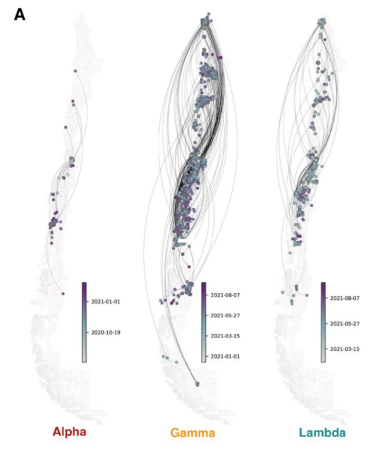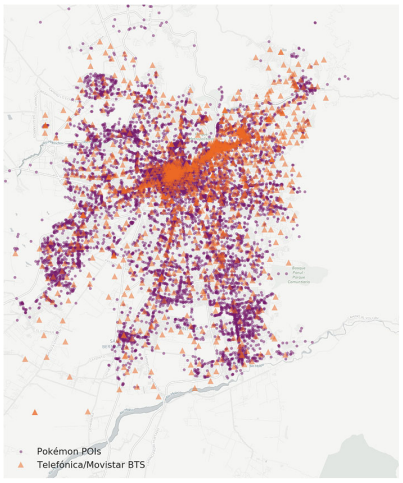Research
 My research interests lie at the intersection of urban mobility,
public policy, and social inequalities, with a particular emphasis on
the impact of gender and socioeconomic factors. My work utilizes
large-scale mobile phone datasets to uncover nuanced patterns of
mobility and their implications for urban planning and policy
design. In Santiago, Chile, my analysis of gender-disaggregated
mobility data revealed a significant gender gap, with women visiting
fewer unique locations and distributing their time less equally among
these locations. This mobility gap is more pronounced in areas with
lower income and limited transportation options, highlighting the need
for gender-sensitive urban planning and policy interventions.
My research interests lie at the intersection of urban mobility,
public policy, and social inequalities, with a particular emphasis on
the impact of gender and socioeconomic factors. My work utilizes
large-scale mobile phone datasets to uncover nuanced patterns of
mobility and their implications for urban planning and policy
design. In Santiago, Chile, my analysis of gender-disaggregated
mobility data revealed a significant gender gap, with women visiting
fewer unique locations and distributing their time less equally among
these locations. This mobility gap is more pronounced in areas with
lower income and limited transportation options, highlighting the need
for gender-sensitive urban planning and policy interventions.

Further exploring the gender dynamics of urban mobility, my research has shown that perceived personal insecurity and fear of crime have a profound impact on individuals’ mobility, particularly among women. This perceived insecurity restricts their movement, underscoring the urgent need for policies that enhance the safety and inclusiveness of public spaces for all, but especially for women.
 The global COVID-19 pandemic offered a unique lens through which to study mobility patterns. My work during this period focused on the dynamics of internal migration and daily mobility in Santiago, revealing that socioeconomic status significantly influenced mobility behaviors during the crisis. Lower-income individuals showed increased daily mobility, possibly due to essential work, while higher-income groups were more likely to relocate, suggesting differential impacts of the pandemic across socioeconomic strata.
The global COVID-19 pandemic offered a unique lens through which to study mobility patterns. My work during this period focused on the dynamics of internal migration and daily mobility in Santiago, revealing that socioeconomic status significantly influenced mobility behaviors during the crisis. Lower-income individuals showed increased daily mobility, possibly due to essential work, while higher-income groups were more likely to relocate, suggesting differential impacts of the pandemic across socioeconomic strata.
In addition to pandemic-related mobility, my research has also delved into the broader implications of mobile phone data for understanding social phenomena. This includes the development of methodologies for inferring users’ home locations from mobile phone data, enhancing the accuracy and efficiency of urban and social studies.
 Moreover, my studies on the spatio-temporal spread of SARS-CoV-2 in Santiago have demonstrated the effectiveness of non-pharmaceutical interventions and highlighted the importance of timely and localized responses to pandemic outbreaks. This research underscores the significant role of mobile phone data in tracking and understanding the spread of infectious diseases.
Moreover, my studies on the spatio-temporal spread of SARS-CoV-2 in Santiago have demonstrated the effectiveness of non-pharmaceutical interventions and highlighted the importance of timely and localized responses to pandemic outbreaks. This research underscores the significant role of mobile phone data in tracking and understanding the spread of infectious diseases.
Lastly, my investigation into news media consumption patterns among different demographics in Santiago has revealed the influence of socio-demographic attributes, such as education and age, on digital news consumption. This line of inquiry contributes to our understanding of how digital behaviors are shaped by broader social and demographic factors.
 Collectively, my research emphasizes the power of mobile phone data in addressing complex urban and social challenges, advocating for data-driven approaches to policy-making that are sensitive to gender, socioeconomic, and public health considerations.
Collectively, my research emphasizes the power of mobile phone data in addressing complex urban and social challenges, advocating for data-driven approaches to policy-making that are sensitive to gender, socioeconomic, and public health considerations.
Some selected papers
- Gauvin, L., Tizzoni, M., Piaggesi, S. et al. Gender gaps in urban mobility. Humanit Soc Sci Commun 7, 11 (2020). https://doi.org/10.1057/s41599-020-0500-x
- Gozzi, N., Tizzoni, M., Chinazzi, M. et al. Estimating the effect of social inequalities on the mitigation of COVID-19 across communities in Santiago de Chile. Nat Commun 12, 2429 (2021). https://doi.org/10.1038/s41467-021-22601-6
- Pappalardo, L., Ferres, L., Sacasa, M. et al. Evaluation of home detection algorithms on mobile phone data using individual-level ground truth. EPJ Data Sci. 10, 29 (2021). https://doi.org/10.1140/epjds/s13688-021-00284-9
- Pappalardo, L., Cornacchia, G., Navarro, V. et al. A dataset to assess mobility changes in Chile following local quarantines. Sci Data 10, 6 (2023). https://doi.org/10.1038/s41597-022-01893-3